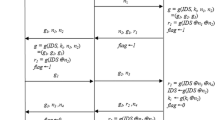Abstract
Radio-frequency Identification (RFID) grouping proof protocol is widely used in medical healthcare industry, transportation industry, crime forensics and so on,it is a research focus in the field of information security. The RFID grouping proof protocol is to prove that some tags belong to the same group and exist simultaneously. To improve the applicability of the RFID grouping proof protocol in low cost tag applications, this paper proposes a new scalable lightweight RFID grouping proof protocol. Tags in the proposed protocol only generate pseudorandom numbers and execute exclusive-or(XOR) operations. An anti-collision algorithm based on adaptive 4-ary pruning query tree (A4PQT) is used to identify the response message of tags. Updates to secret information in tags are kept synchronized with the verifier during the entire grouping proof process. Based on these innovations, the proposed protocol resolves the scalability issue for low-cost tag systems and improves the efficiency and security of the authentication that is generated by the grouping proof. Compared with other state-of-the art protocols, it is shows that the proposed protocol requires lower tag-side computational complexity, thereby achieving an effective balance between protocol security and efficiency.

Similar content being viewed by others
References
Juels A. (2004). “Yoking-proofs” for RFID tags. In Proceedings of the first international workshop on pervasive computing and communication security (pp. 138–143).
Peris-Lopez, P., Hernandez-Castro, J. C., Estevez-Tapiador, J. M., et al. (2009). LAMED—A PRNG for EPC Class-1 Generation-2 RFID specification. Computer Standards & Interfaces, 31(1), 88–97.
Lo, N. W., & Yeh, K. H. (2010). Anonymous coexistence proofs for RFID tags. Journal of Information Science and Engineering, 26(4), 1213–1230.
Liu, H., He, D., Xiong, Q., et al. (2013). Grouping-proofs-based authentication protocol for distributed RFID systems. IEEE Transactions on Parallel and Distributed Systems, 24(7), 1321–1330.
Zhang, Z., & Xu, Q. L. (2011). Grouping proof RFID protocol for UC security under networking environments. Journal of Computers, 34(7), 1188–1194.
Chien, H. Y., Yang, C. C., Wu, T. C., et al. (2011). Two RFID-based solutions to enhance inpatient medication safety. Journal of Medical Systems, 35(3), 369–375.
Huang, P., Mu, H., & Zhang, C. (2014). A new lightweight RFID grouping proof protocol. In Y.-M. Huang, H.-C. Chao, D.-J. Deng & J. J. (Jong Hyuk) Park (Eds.), Advanced technologies, embedded and multimedia for human-centric computing (pp. 869–876). Dordrecht: Springer.
Peris-Lopez, P., Orfila, A., Hernandez-Castro, J. C., et al. (2011). Flaws on RFID grouping-proofs. Guidelines for future sound protocols. Journal of Network and Computer Applications, 34(3), 833–845.
Wu, S., Chen, K., & Zhu, Y. (2012). A secure lightweight RFID binding proof protocol for medication errors and patient safety. Journal of Medical Systems, 36(5), 2743–2749.
Sundaresan, S., Doss, R., & Zhou, W. (2013). Offline grouping proof protocol for RFID systems. In Proceedings of the IEEE 9th international conference on wireless and mobile computing, networking and communications (WiMob) (pp. 247–252).
Lv, C., Li, H., Ma, J., et al. (2011). Security analysis of a privacy-preserving ECC-based grouping-proof protocol. Journal of Convergence Information Technology, 6(3), 113–119.
Ma, C., Lin, J., Wang, Y., et al. (2012). Offline RFID grouping proofs with trusted timestamps. In Proceedings of the IEEE 11th international conference on trust, security and privacy in computing and communications (TrustCom) (pp. 674–681).
Zhang, W., Guo, Y., Tang, X., et al. (2013). An efficient adaptive anticollision algorithm based on 4-Ary Pruning Query Tree. International Journal of Distributed Sensor Networks, 2013, 1–7.
Ma, C. S. (2011). Low cost RFID authentication protocol for forward privacy. Journal of Computers, 34(8), 1387–1398.
Mei, Y., Jiang, G., Zhang, W., & Cui, Y. (2014). A collaboratively hidden location privacy scheme for vanets. International Journal of Distributed Sensor Networks, 2014(1), 1–6.
Zhang, Wei, Longkai, Wu, Liu, Sanya, et al. (2016). A trajectory privacy model for radio-frequency identification system. Wireless Personal Communications, 90(3), 1121–1134.
Zhang, Wei, Liu, Sanya, Wang, Shengming, et al. (2017). An efficient lightweight RFID authentication protocol with strong trajectory privacy protection. Wireless Personal Communications, 8, 1–14.
Cheng, S., Varadharajan, V., Mu, Y., et al. (2017) An efficient and provably secure RFID grouping proof protocol. In The Australasian computer science week multiconference (pp. 1–7).
Guo, Y. M., Li, S. D., Chen, Z. H., et al. (2015). A lightweight privacy-preserving grouping proof protocol for RFID systems. Tien Tzu Hsueh Pao/acta Electronica Sinica, 43(2), 289–292.
Hsi, C. T., Lien, Y. H., Chiu, J. H., et al. (2015). solving scalability problems on secure RFID grouping-proof protocol. Wireless Personal Communications, 84(2), 1069–1088.
Rostampour, S., Bagheri, N., Hosseinzadeh, M., et al. (2017). An authenticated encryption based grouping proof protocol for RFID systems. Security & Communication Networks, 9(18), 5581–5590.
Rostampour, S., Bagheri, N., Hosseinzadeh, M., et al. (2017). A scalable and lightweight grouping proof protocol for internet of things applications. Journal of Supercomputing, 3, 1–16.
Acknowledgements
We would like to thank the editor and anonymous reviewers for their valuable suggestions. This research was funded by visualization technology research and demonstration platform of Local Chronicles (2015BAK07B03), National Key R&D Plan (2017YFB1401300).
Author information
Authors and Affiliations
Corresponding author
Rights and permissions
About this article
Cite this article
Zhang, W., Qin, S., Wang, S. et al. A New Scalable Lightweight Grouping Proof Protocol for RFID systems. Wireless Pers Commun 103, 133–143 (2018). https://doi.org/10.1007/s11277-018-5430-1
Published:
Issue Date:
DOI: https://doi.org/10.1007/s11277-018-5430-1




